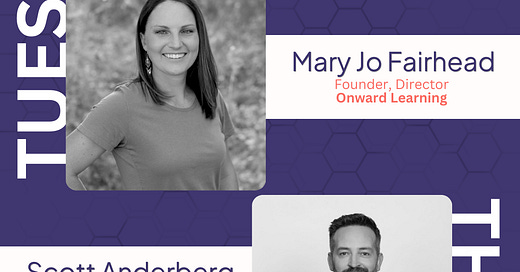Every Student, Everywhere | Mary Jo Fairhead & Scott Anderberg
In the newsletter this week: Two thought-provoking podcasts, Consensus Impossibility, & Conference
🎙️ This Week on the Podcast
🎙️ Episode 20, Thinking Outside the Box, Mary Jo Fairhead
Mary Jo Fairhead, founder of Onward Learning, is building an education model on the Pine Ridge Reservation that centers love, cultural relevance, and personalized learning—radically reimagining what school can look like in a high-need, rural Indigenous community. A member of the Oglala Sioux Tribe and former high school teacher and principal, Mary Jo saw firsthand how traditional school systems—especially those emphasizing compliance and standardized testing—consistently failed to serve Native students. Driven by both burnout and a clear vision for something better, she founded Onward Learning to create a “love-based,” not fear-based, environment that honors the mental health, identity, and brilliance of every child.
Onward Learning operates with intentionally small class sizes (max 12:1), no homework, and no standardized testing. Students learn at their own pace in a highly personalized curriculum that accommodates neurodivergence and supports both academic and emotional development. Outdoor time is prioritized as a right, not a reward, and creativity—through art, music, and play—is integrated as a central tenet. The school also incorporates social-emotional learning rooted in Lakota language and culture, drawing on the wisdom of local elders and mental health professionals. This culturally grounded, community-driven approach directly addresses the mental health crisis impacting Native youth on the reservation, including a suicide rate three times the national average.
What sets Mary Jo’s model apart is not only its innovation but its deep commitment to community. Families and students themselves are the school’s best advocates, sharing stories of reduced anxiety, academic breakthroughs, and newfound joy in learning. Whether it’s a student advancing beyond grade level or simply feeling safe enough to be themselves, Onward Learning is redefining success on its own terms—and proving what’s possible when education is built with love, inclusion, and cultural wisdom at its core.
Books & Curriculum
People
📖 One Key Quote: We flip the script and instead of fear-based environment, we call it a love-based environment.
🎙️ Episode 21, Opensource is for All, Scott Anderberg
Scott Anderberg, CEO of Moodle, brings a global perspective and deep experience across the education and EdTech sectors. His career began in the early 2000s at eCollege, where he moved through roles in tech support, product, and sales before joining Pearson, eventually leading its OPM (online program management) operations outside North America. His international career—from the U.S. to the UK, Australia, and back—was driven by a commitment to educational access, particularly in developing regions. This global exposure cemented his belief in the transformative power of high-quality education and made Moodle’s mission of equitable access a natural next step.
At Moodle, Anderberg is navigating a significant leadership transition as he succeeds founder Martin Dougiamas. He emphasizes that continuity and innovation can—and should—coexist, particularly within the open-source community that Moodle serves. He credits the strength of the organization to its inclusive, transparent culture and believes in leading with humility and curiosity. In his first year, Anderberg has focused on listening deeply, learning the nuances of the organization, and beginning to build relationships that reinforce Moodle’s global and community-driven identity.
Looking ahead, Anderberg’s vision for Moodle includes maintaining its commitment to open-source access while expanding direct services, strengthening the partner network, and accelerating product innovation. He’s especially excited about empowering contributors around the world, including those in under-resourced areas, through features like the new AI subsystem. By grounding decisions in inclusivity and local context, Anderberg hopes to position Moodle for long-term global relevance, guided by a hundred-year vision. His leadership is marked by a deep respect for Moodle’s legacy and a forward-looking approach grounded in equity, openness, and collaboration.
People
Organizations / Companies / Platforms
Books
Continuous Discovery Habits
📖 One Key Quote: Education I think is linked across geographies by an innate human curiosity. There is a motivation to learn, and what education does is hopefully when it's done well, creates a structure around that that allows people to do it together and provide some guidance
📘 What I’m Reading
Building consensus is rarely easy. In a new paper summarized in a recent HBR article, researchers found that disagreement about a new idea can lead to stakeholders viewing the idea as too risky. Instead of trying to build consensus cold when adopting something new, they recommend gathering information about the evaluator’s reference points and developing criteria that can lead to more focused discussions reducing that ill-fated disagreement.
In schools especially, with so many stakeholders—each with distinct priorities and perspectives—most decisions are bound to leave someone unsatisfied.
I am not certain Liberty School District 70, outside Chicago, has read this research but they are charting a different course from most schools on the path to AI adoption and implementation. A few years ago, district leaders recognized that AI education wouldn’t be optional for long. Instead of rolling out a top-down initiative, they invited educators to help shape what AI integration could look like. They launched an AI working group called the Spark Initiative and asked for volunteers. In year one, 50 teachers joined. In year two, 70. Together, this growing group tested tools, shared learnings, and developed an approach rooted in practice—not mandates.
While many districts are still navigating pushback or uncertainty, Liberty is setting the pace—demonstrating what's possible when innovation starts with trust and shared ownership. It was a privilege to meet their leadership team and help tell this story at ASU+GSV.
If you’re curious about the original research, you can read it here.
💭 What I’m Thinking About
I’m writing this post from my seat on the flight home from San Diego, surrounded by other ASU+GSV attendees. We’re all a little tired. You can hear quiet conversations about AI, sessions, and meetings. Most of us eventually opened our laptops mid-flight—maybe out of habit, maybe out of inspiration.
As I reflect on my experience at the conference, three themes stand out:
There’s a heightened awareness of how federal rhetoric and policy decisions are shaping the education landscape.
Conversations about funding, politics, and the implications for schools were front and center. People are paying attention.The AI conversation has matured.
Compared to last year’s hype, there’s now a healthy skepticism in the room. As someone who believes deeply in the potential of AI, I welcome that scrutiny. It pushes us to build with more intention, center human connection, and create tools that truly serve schools and communities.This field is filled with brilliance and purpose.
So many of the people I met are here not just to build something—but to serve students. There's a shared belief that impact matters more than shiny innovation or financial return. Progress will come from collective focus, not individual ambition. That’s something I care deeply about.
More thoughts are still percolating, but these three takeaways feel like the right (slightly sleep-deprived) place to start.





